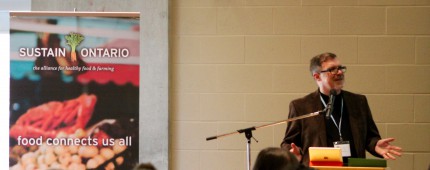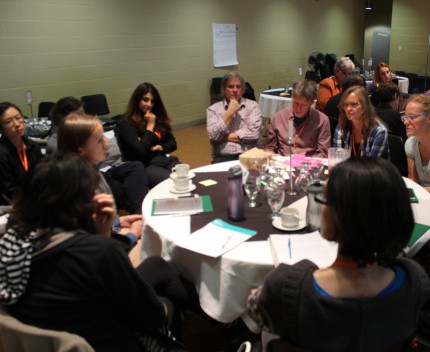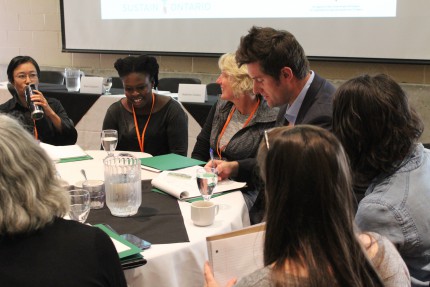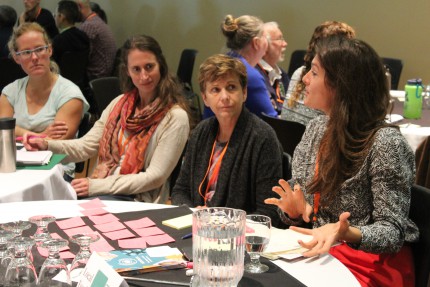Sprouting Ideas for Change: Highlights from Cultivating Our Capacity
Posted: October 24, 2016
Categories: GoodFoodBites / News from Sustain Ontario
On October 13, 2016 Sustain Ontario hosted an internal meeting for our members and networks to learn, share, and dig into 6 key topic areas: farmland preservation, procurement, evaluations, urban agriculture, food waste, and food systems framework. Each topic was represented by a panel of experts from around Ontario, highlighting the innovative work they are doing in their field. During breakout sessions participants explored deeper into the roots of each topic highlighting barriers and opportunities for change.
Interested in attending Sustain Ontario’s future events and networking sessions? Become a member today!
Seeds for a Revolution: a snapshot of the discussions cultivated during breakout sessions
Farmland Preservation
There are many challenges that face the preservation of farmland in Ontario. One major challenge is infrastructure plans by the government or investors involved with prime farmland areas. This is paired and contrasted with farmers selling up land due to old age or not having a viable and steady income, which enables the opportunity for the land to be sold cheaply and follow infrastructure plans. Lastly, although land could be sold to the next generation of farmers, the accessibility to land is challenging due to high operating costs and lower profit margins. However, this session’s group discussed seeds of hope in order to educate and find solutions. This included building alliances with other people in different sectors and to learn about each other’s issues and create a solid network of advocates for change. Another idea is to find solutions that will allow better accessibility to new and young farmers, find out what works for them and what benefits they want, and pair young or new farmers with older farmers to allow opportunities to grow and learn.
- Join Sustain Ontario’s Farmland & Agriculture Network to add your voice to our newest network. Email farmsandag[at]sustainontario.ca
Procurement
Finding accessibility to allow local food and smaller scale producers into institutions such as schools and hospitals can be very difficult. The session’s groups discussed several ways in which we can get people engaged and excited about putting pressure to allow a better access to local and smaller scale food producers. Local food isn’t accessible all year around so let’s educate people about seasonal foods and get people enthusiastic about the idea of seasonal menus. By building connections with growers we can help link institutions to producers in their region, this allows an opportunity to influence and inspire the same framework within their workplace. Procurement contracts can be challenging to allow ideas like this to grow but institutions such as Ryerson University have overcome the challenges and now serve ‘yummy’ food produced on their rooftop garden!
- Enhance your knowledge on procurement read out toolkit
Evaluations
A challenge for nonprofits is creating meaningful evaluations. One of the many themes that came up when discussing evaluations was that evaluating your work can be used as a tool of empowerment. You are accountable to your funder and to your beneficiary. How do you make both happy? How do you balance both their interests? Many people brought up the fact that sometimes the outcomes non-profits need to address may not be the outcomes that create the most impact to the beneficiaries. A solution! First, be honest up front to the beneficiaries about the rate of evaluations within your program and send friendly reminders. Secondly, when you need to address funders about the progress of your outcomes outlined in your agreement include other objectives and materials that helped make an impact. Include photos and stories but also don’t forget to have tangible numbers and facts to back up your additional material. This may be additional work but it will make you stand out and in the future hopefully get more funding!
- Build your evaluation knowledge and resources with our own curated collection of online tools
Urban Agriculture
Urban agriculture has experienced a rising demand due to food security becoming mainstream and from the popularity of community gardens and backyard gardens. However, there is still more that needs to be done to educate and generate better accessibility. Urban agriculture must also integrate community engagement and food justice. For this vision to flourish, community gardens must be run by the respective communities. As such, all major decision about the space should be directed by the members of the neighbourhood–this will create stronger and more resilient communities. Another concern with urban agriculture is the scarcity of space. In order to create space for growth, we must get innovative! Roof tops gardens, developing supporting policies and linking different movements to agriculture! Let’s think about collaborative action where everyone has a voice!
Food Waste
Food waste can be thought of as out of sight and out of mind, which we all know isn’t true. As a society we have become disengaged with what happens to our waste and what the true cost is for waste. The major problems brought up about food waste during the discussion are: municipalities do not have the funding to deal with food waste, there are climate change issues as soon as the organics hit the landfill, we need to account for health when calculating the impact of food waste and finally the consumer mentality needs to change on ideas like ‘best before’ dates and ‘misfit’ ugly produce. Ways in which we can help advocate for better policies is through education and collaborative initiatives where people’s’ voice come together in solidarity and mobilize for change!
- Check out what others are doing to combat food waste and learn about how you can help reduce food waste
Food Systems Framework
How do we create meaningful change in our food systems? What tools and resources do we need to make this change? We have to look at creating change which involve the voices of everyone and the support from key people in powerful positions. There has to be food sharing that embraces everyone and calculates for different areas needing more or less food assets than others. It takes collaborative action and strategic thinking to change the system. If you want to learn more about projects that take this approach check out Toronto Food Policy Council’s project called Food by Ward.
To learn more about the six topics discussed at Cultivating Our Capacity check out the Food Initiatives Greenhouse. Become a member today to join the discussion and receive updates on future Sustain Ontario events, workshops, and network meetings!




